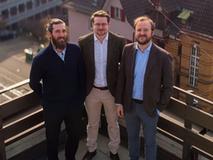CHF 10,000 for customizable 3D bone marrow microphysiological systems; new liquid biopsy of cancer, next-gen systemic risk intelligence for pharma; a full-fledged learning platform; and next-gen silicon design
10.10.2025
beMarrow, CAPTAIM Apheryon, deRISK, LearningLevels, and Mentis were selected at the first stage of Venture Kick, which provides financial and entrepreneurial support. Their projects bridge the gap between preclinical and clinical outcomes for hematological disorders; enable full-scale tumor profiling for all patients, including those without tumor lesions accessible to classical biopsies or surgery; provide a new generation of systemic risk intelligence for pharmaceutical supply chains; make learning more engaging for students and ease the lives of teachers; and build an AI-driven platform for next-gen chip silicon design that transforms specifications into verifiable artifacts.
 |
 beMarrow: Dilara Perver
|
 CAPTAIM Apheyron: Massimo Saini (Pioneer fellow), Alexander Ring, Andreas Wicki and Nicola Aceto (Co-inventors)
|
 deRISC: Giona Casiraghi, Georges Andres, and Luca Verginer
|
 LearningLevels: CEO NikoMojado, COO Julian Mojado, CPO Jessica Baertschi, and CTO Nils Marty
|
 Mentis: CEO Jelena Lalic and CTO Toma Gavric
|
beMarrow: Bridging the Gap Between Preclinical and Clinical Outcomes for Hematological Disorders
One of the main challenges in hematopoietic drug development is the lack of reliable in vitro models that accurately predict drug efficacy and toxicity, thereby slowing the progress of effective new therapies. Mostly used conventional cultures do not sustain hematopoietic stem and progenitor cell function over time, and stromal feeder systems lack the architectural complexity needed to mimic drug resistance. This limits the assessment of therapeutic response and safety, especially for long-term studies, and leads to higher rates of late-stage drug failure.
Initiated by Dr. Dilara Perver at Prof. Dr. Viola Vogel’s Laboratory of Applied Mechanobiology at ETH Zürich, beMarrow develops customizable three-dimensional bone marrow microphysiological systems (BM-MPS) that more closely reflect the complexity of human bone marrow in health, disease, and during combinatorial advanced therapies. With a current focus on the most common leukemia in adults, Acute Myeloid Leukemia (AML), and Myelodysplastic Syndromes (MS), the model systems were developed to integrate seamlessly with standard laboratory workflows, making adoption straightforward and enabling the generation of scalable, multi-model, human-relevant data. beMarrow addresses a global preclinical testing market valued at over CHF 5 billion in 2023, with demand rising as regulatory bodies mandate non-animal methodologies and functional, bidirectional assays.
Venture Kick funding will support Dr. Dilara Perver in her early business development efforts.
CAPTAIM - Apheryon: Next-generation liquid biopsy of cancer
Most cancer patients still lack access to personalized vaccines because traditional biopsies are invasive, risky, or unfeasible. This exclusion limits precision oncology and leaves a large patient segment without tailored therapeutic options.
Founded by scientists and clinicians from ETH Zurich and University Hospital Zurich, Apheryon AG is developing CAPTAIM as its main product, a next-generation liquid biopsy using cytapheresis and microfluidics to isolate millions of circulating tumor cells (CTCs). CAPTAIM enables full-scale tumor profiling for all patients, including those without tumor lesions accessible to classical biopsies or surgery. Targeting the USD 12B liquid biopsy market, it expands eligibility for cancer vaccines and precision therapies, offering a breakthrough diagnostic bridge between oncology clinics and pharma.
The Venture Kick funds will cover incorporation costs for Apheryon AG, including expert legal support from a leading Swiss firm to draft the shareholders’ agreement, along with notary fees and overhead—securing cofounder alignment and a solid launch framework.
deRISC: Systemic risk intelligence for pharmaceutical supply chains
Pharmaceutical supply chains are fragile and opaque. Local shocks such as factory shutdowns, transport bottlenecks, or trade restrictions cascade globally, leading to medicine shortages and costly disruptions. Yet today’s tools overlook the systemic interdependencies that determine how risks spread.
Founded by ETH Zurich researchers Dr. Georges Andres, Dr. Giona Casiraghi, and Dr. Luca Verginer, deRISC provides a new generation of systemic risk intelligence for pharmaceutical supply chains. Its innovation lies in combining a global map of medicines, manufacturers, and production pathways with proprietary systemic risk models. This enables the simulation of disruption cascades, the detection of hidden risks, and the quantification of systemic vulnerabilities. By focusing on pharma-specific interdependencies and enabling decentralized, federated resilience estimation, deRISC offers the industry a collaborative platform to anticipate shortages and strengthen supply security. Positioned within the rapidly growing supply chain risk management and digital intelligence market (>CHF 10B), deRISC aims to become the new standard for resilience in pharma.
The Venture Kick funds will support the development of deRISC’s business model and the advancement of pilot projects with industry partners.
LearningLevels: A digital learning platform leveraging gamification and social interaction to enhance students’ engagement
An emerging trend in schools is independent study hours for students. The reason is an influx of students, thus a lack of space in schools and less time from teachers per student. Students are confronted and overwhelmed with work but rarely provided with direction.
At the same time, the teachers are overworked and can hardly track their students’ progress, provide them with material, and handle all administrative tasks at once.
From a small idea, Nils Marti and Niko Mojado began implementing a habit tracker, which soon evolved into a full-fledged learning platform after Jessica Bärtschi and Julian Mojado were onboarded. The initial goal remains unchanged: to make learning more engaging for students and to ease the lives of teachers. By providing teachers with the ability to easily structure their material into courses with tangible goals in the form of experience points for students. The global K-12 EdTech market represents a USD 30–70 billion opportunity, driven by over 1.5 billion students worldwide and rapidly growing demand for digital learning solutions.
The Venture Kick funds will help LearningLevels expand its content, strengthen its platform for teachers and students, and accelerate its growth into new schools and markets.
Mentis: Agentic platform for next-gen silicon design
More than 80% of chips fail first silicon due to a spec-to-verification gap. Ambiguous or changing specifications are never fully verified, leading to costly bugs, re-spins, and billions lost annually.
The founders are experienced ASIC and FPGA engineers now building an AI-driven platform that transforms specifications into verifiable artifacts. Their solution automatically generates assertions, coverage points, and functional models directly from specifications and links them with code and tests in a traceable graph-based system. The spec-driven approach reduces re-spins by 60% and addresses a USD 10B+ inefficiency in the USD 200B semiconductor R&D market.
Mentis team will use the Venture Kick funds to engage directly with leading semiconductor companies and research centers across Europe.
One of the main challenges in hematopoietic drug development is the lack of reliable in vitro models that accurately predict drug efficacy and toxicity, thereby slowing the progress of effective new therapies. Mostly used conventional cultures do not sustain hematopoietic stem and progenitor cell function over time, and stromal feeder systems lack the architectural complexity needed to mimic drug resistance. This limits the assessment of therapeutic response and safety, especially for long-term studies, and leads to higher rates of late-stage drug failure.
Initiated by Dr. Dilara Perver at Prof. Dr. Viola Vogel’s Laboratory of Applied Mechanobiology at ETH Zürich, beMarrow develops customizable three-dimensional bone marrow microphysiological systems (BM-MPS) that more closely reflect the complexity of human bone marrow in health, disease, and during combinatorial advanced therapies. With a current focus on the most common leukemia in adults, Acute Myeloid Leukemia (AML), and Myelodysplastic Syndromes (MS), the model systems were developed to integrate seamlessly with standard laboratory workflows, making adoption straightforward and enabling the generation of scalable, multi-model, human-relevant data. beMarrow addresses a global preclinical testing market valued at over CHF 5 billion in 2023, with demand rising as regulatory bodies mandate non-animal methodologies and functional, bidirectional assays.
Venture Kick funding will support Dr. Dilara Perver in her early business development efforts.
CAPTAIM - Apheryon: Next-generation liquid biopsy of cancer
Most cancer patients still lack access to personalized vaccines because traditional biopsies are invasive, risky, or unfeasible. This exclusion limits precision oncology and leaves a large patient segment without tailored therapeutic options.
Founded by scientists and clinicians from ETH Zurich and University Hospital Zurich, Apheryon AG is developing CAPTAIM as its main product, a next-generation liquid biopsy using cytapheresis and microfluidics to isolate millions of circulating tumor cells (CTCs). CAPTAIM enables full-scale tumor profiling for all patients, including those without tumor lesions accessible to classical biopsies or surgery. Targeting the USD 12B liquid biopsy market, it expands eligibility for cancer vaccines and precision therapies, offering a breakthrough diagnostic bridge between oncology clinics and pharma.
The Venture Kick funds will cover incorporation costs for Apheryon AG, including expert legal support from a leading Swiss firm to draft the shareholders’ agreement, along with notary fees and overhead—securing cofounder alignment and a solid launch framework.
deRISC: Systemic risk intelligence for pharmaceutical supply chains
Pharmaceutical supply chains are fragile and opaque. Local shocks such as factory shutdowns, transport bottlenecks, or trade restrictions cascade globally, leading to medicine shortages and costly disruptions. Yet today’s tools overlook the systemic interdependencies that determine how risks spread.
Founded by ETH Zurich researchers Dr. Georges Andres, Dr. Giona Casiraghi, and Dr. Luca Verginer, deRISC provides a new generation of systemic risk intelligence for pharmaceutical supply chains. Its innovation lies in combining a global map of medicines, manufacturers, and production pathways with proprietary systemic risk models. This enables the simulation of disruption cascades, the detection of hidden risks, and the quantification of systemic vulnerabilities. By focusing on pharma-specific interdependencies and enabling decentralized, federated resilience estimation, deRISC offers the industry a collaborative platform to anticipate shortages and strengthen supply security. Positioned within the rapidly growing supply chain risk management and digital intelligence market (>CHF 10B), deRISC aims to become the new standard for resilience in pharma.
The Venture Kick funds will support the development of deRISC’s business model and the advancement of pilot projects with industry partners.
LearningLevels: A digital learning platform leveraging gamification and social interaction to enhance students’ engagement
An emerging trend in schools is independent study hours for students. The reason is an influx of students, thus a lack of space in schools and less time from teachers per student. Students are confronted and overwhelmed with work but rarely provided with direction.
At the same time, the teachers are overworked and can hardly track their students’ progress, provide them with material, and handle all administrative tasks at once.
From a small idea, Nils Marti and Niko Mojado began implementing a habit tracker, which soon evolved into a full-fledged learning platform after Jessica Bärtschi and Julian Mojado were onboarded. The initial goal remains unchanged: to make learning more engaging for students and to ease the lives of teachers. By providing teachers with the ability to easily structure their material into courses with tangible goals in the form of experience points for students. The global K-12 EdTech market represents a USD 30–70 billion opportunity, driven by over 1.5 billion students worldwide and rapidly growing demand for digital learning solutions.
The Venture Kick funds will help LearningLevels expand its content, strengthen its platform for teachers and students, and accelerate its growth into new schools and markets.
Mentis: Agentic platform for next-gen silicon design
More than 80% of chips fail first silicon due to a spec-to-verification gap. Ambiguous or changing specifications are never fully verified, leading to costly bugs, re-spins, and billions lost annually.
The founders are experienced ASIC and FPGA engineers now building an AI-driven platform that transforms specifications into verifiable artifacts. Their solution automatically generates assertions, coverage points, and functional models directly from specifications and links them with code and tests in a traceable graph-based system. The spec-driven approach reduces re-spins by 60% and addresses a USD 10B+ inefficiency in the USD 200B semiconductor R&D market.
Mentis team will use the Venture Kick funds to engage directly with leading semiconductor companies and research centers across Europe.


